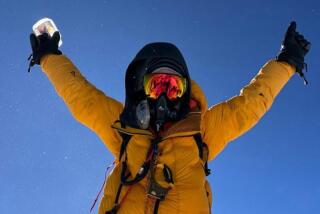Babu Chhiri; Sherpa Guide Who Set Everest Records Is Claimed by the Mountain
- Share via
KATMANDU, Nepal — Babu Chhiri, a Sherpa guide who made the fastest trip up Mt. Everest and stayed at the top the longest without using bottled oxygen, has died on the world’s highest peak.
The 35-year-old Chhiri was guiding a team of mountaineers Sunday when he slipped and fell 100 feet into a crevasse at Camp 2, at 20,400 feet.
Babu Sherpa, a friend and his partner in an Everest climbing business, said Monday that Chhiri left camp alone to take photographs, and his absence was not noticed until dinner time three hours later. Teammates searched the snowy slopes, following his footprints. His body was found about midnight.
“It was only a short fall; if there had been somebody around at the time to help him out, he would have definitely survived,” said Babu Sherpa.
Last year, Chhiri climbed to the 29,035-foot summit from the 17,160-foot base camp in just 16 hours and 56 minutes. He shattered the record set by a fellow Sherpa, Kaji, in 1998, who made the climb in 20 hours and 24 minutes.
Most climbers take two to four days to cover the distance from the base camp to the summit.
On May 6, 1999, Chhiri became the first man to remain on the summit without bottled oxygen for 21 hours. Most foreign climbers remain at the peak just long enough to have their photo taken.
Chhiri is survived by his wife and six daughters. Before making mountaineering his career, he was a yak herder and potato farmer.
In an interview with Associated Press in July, Chhiri said that with the money he was collecting through his record climbs, he hoped to build and staff a primary school in his village of Taksindo.
“I never got the chance to go to school,” he said. “I want all my girls, all the children, to get the education that I never had.”
Sherpas, who live at the foot of the Himalayas, are renowned for their mountaineering skills. They were mostly yak herders and traders until Nepal opened its borders to tourism in 1950.
Their stamina and knowledge of the mountains make them expert guides and porters. However, the Sherpas have gained little of the enormous financial rewards from Everest expeditions.
“We don’t get the recognition we deserve,” Chhiri told AP, noting that more than 180 people have lost their lives attempting to climb Everest; at least 40 have been Sherpas.
Foreign climbing teams of seven must pay the Nepalese government $50,000 for a permit to scale Everest. Though most Western commercial guides charge their clients up to $60,000 each, a Sherpa team typically gets $1,500 per climb.
Chhiri got his first taste of mountaineering when he was 13 and worked as a base camp porter for the experienced Sherpas who guided foreigners to the forbidding summit.
In 1989, he successfully led a Russian team up Mt. Kanchenjunga, the world’s third-highest peak. A year later he conquered Everest, and subsequently reached the summit 10 more times. In 1995, he became the only man to reach the peak twice in 14 days.
“The view is beautiful from the top of the world,” he told AP. “Everest is like a friend; Everest is God.”
Chhiri’s body will be flown to Katmandu today. Rescue helicopters were forced to return Monday because of heavy snowfall on the mountain. Teammates were expected to carry his body to the base camp.
The funeral has not yet been scheduled.
More to Read
Sign up for Essential California
The most important California stories and recommendations in your inbox every morning.
You may occasionally receive promotional content from the Los Angeles Times.













